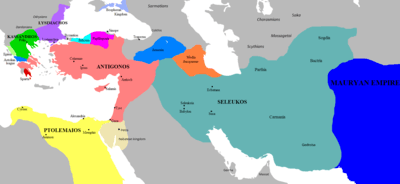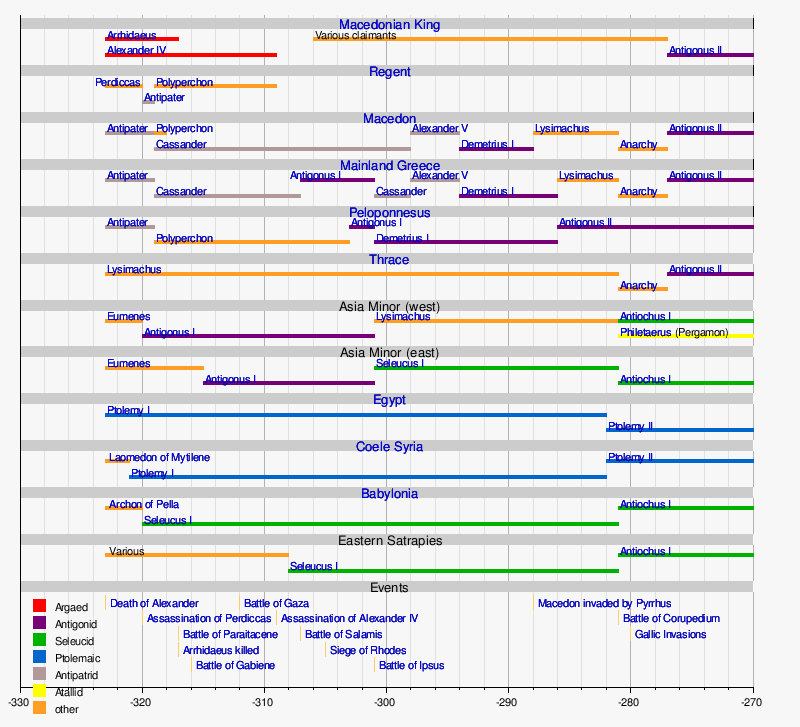Antigonus I Monophthalmus
| Antigonus I Monophthalmus Ἀντίγονος ὁ Μονόφθαλμος | |
|---|---|
| Basileus | |
.jpg) Coin of Antigonus, the Greek inscription reads "ΒΑΣΙΛΕΩΣ ΑΝΤΙΓΟΝΟΥ" meaning [coin] of King Antigonus | |
| Reign | 306–301 BC |
| Coronation | 306 BC, Antigonia. |
| Predecessor | Alexander IV |
| Successor | Demetrius I |
| Born |
382 BC Elimeia, Macedon, Ancient Greece |
| Died |
301 BC (aged 81) Ipsus, Phrygia |
| Consort | Stratonice |
| Issue | Demetrius I, Philip |
| Dynasty | Antigonid dynasty |
| Father | Philip (the son of Machatas?) |
Antigonus I Monophthalmus (Ancient Greek: Ἀντίγονος ὁ Μονόφθαλμος, translit. Antigonos ho Monophthalmos, Antigonus the One-eyed, 382–301 BC), son of Philip from Elimeia, was a Macedonian nobleman, general, and satrap under Alexander the Great. During his early life he served under Philip II, and he was a major figure in the Wars of the Diadochi after Alexander's death, declaring himself king in 306 BC and establishing the Antigonid dynasty.
Biography
Career
Antigonus was appointed governor of Greater Phrygia in 333 BC. He was primarily responsible for defending Alexander's lines of supply and communication during the latter's extended campaign against the Achaemenid Persian Empire. Following Alexander's victory at Issus, the Persian mercenary commander Memnon of Rhodes ordered a counter-attack into Asia Minor in an attempt to sever Alexander's lines of supply and communication; however, Antigonus defeated the Persian forces in three separate battles.
As part of the division of the provinces after Alexander's death in 323 BC, Antigonus also received Pamphylia and Lycia from Perdiccas, regent of the empire, at the Partition of Babylon. However, he incurred the enmity of Perdiccas by refusing to assist Eumenes to obtain possession of the provinces allotted to him, Paphlagonia and Cappadocia.[1] Leonnatus had left with his army for Greece, leaving Antigonus alone to deal with Cappadocia, a task he apparently couldn't complete without additional aid.
Perdiccas seems to have viewed this as a direct affront to his authority and led the royal army to conquer the area. From there Perdiccas turned west towards Phrygia in order to humble Antigonus, who escaped with his son Demetrius to Greece, where he obtained the favour of Antipater, regent of Macedonia (321 BC),[1] and Craterus.
With the death of Perdiccas in 321 BC, a new attempt at dividing the empire took place at Triparadisus and Antigonus found himself entrusted with the command of the war against Eumenes, who had joined Perdiccas against the coalition of generals, including Antipater, Antigonus, Ptolemy and Craterus. Eumenes was defeated and forced to retire to the fortress of Nora (Greek: Νῶρα) in Cappadocia. Another army that was marching to Eumenes' relief was routed by Antigonus.[1]
When Antipater died in 319 BC, he gave the regentship to Polyperchon, excluding Cassander, his son. Antigonus and the other dynasts refused to recognize Polyperchon, since it would have undermined their own ambitions. Antigonus entered into negotiations with Eumenes, but Eumenes had already been swayed by Polyperchon, who gave him authority over all other generals within the empire. Effecting his escape from Nora, Eumenes raised an army and built a fleet in Cilicia and Phoenicia, and soon after formed a coalition with the satraps of the eastern provinces.[1] Antigonus fought against Eumenes in two great battles at Paraitacene in 317 BC and Gabiene in 316 BC. Both were inconclusive. However, in the aftermath of the second battle, Antigonus managed to capture the families and the valuables of the Silvershields, an elite regiment within Eumenes' army, who in turn handed over Eumenes to Antigonus in return for their release. After some deliberation, Antigonus had Eumenes executed.
As a result, Antigonus now was in possession of the empire's Asian territories, his authority stretching from the eastern satrapies to Syria and Asia Minor in the west. He seized the treasuries at Susa and entered Babylon. The governor of Babylon, Seleucus, fled to Ptolemy and entered into a league with him, Lysimachus and Cassander (315 BC) against Antigonus. In 314 BC Antigonus invaded Phoenicia, under Ptolemy's control, and besieged Tyre for more than a year. His son Demetrius was defeated at the Battle of Gaza by Ptolemy in 312 BC, and after the battle, Seleucus made his way back to Babylonia. Seleucus returned to Babylon in order to build up a base of his own, and he soon established control of the eastern satrapies. The Babylonian War took place between Antigonus and Seleucus, resulting in Seleucus defeating both Demetrius and Antigonus, and securing Babylonia.
After the Babylonian War had been going with varying success from 315 BC to 311 BC, a peace was concluded, through which the government of Asia Minor and Syria was provisionally secured by Antigonus. This agreement was soon violated by Ptolemy and Cassander based on the pretext that garrisons had been placed in some of the free Greek cities by Antigonus. Ptolemy and Cassander renewed hostilities against Antigonus. Demetrius Poliorcetes, the son of Antigonus, wrested part of Greece from Cassander.[1]
After defeating Ptolemy at the naval Battle of Salamis in 306 BC, Demetrius conquered Cyprus. Following that victory Antigonus assumed the title of king and bestowed the same upon his son.[1] This was effectively a declaration by Antigonus that he now was independent from the empire. The other dynasts, Cassander, Ptolemy, Lysimachus and Seleucus, soon followed Antigonus' lead and declared themselves to be kings.
Antigonus now prepared a large army and a formidable fleet, the command of which he gave to Demetrius, and hastened to attack Ptolemy in his own dominions. His invasion of Egypt, however, proved a failure as he was unable to penetrate Ptolemy's defences and was obliged to retire,[1] although he inflicted heavy losses on Ptolemy.
In 305 BC, Demetrius attempted the reduction of Rhodes, which had refused to assist Antigonus against Egypt.[1] The siege of Rhodes lasted a year and ended in 304 BC when Demetrius, meeting with obstinate resistance, was obliged to make a peace treaty upon the terms that the Rhodians would build ships for Antigonus and aid him against any enemy except for Ptolemy, on whom they bestowed the title Soter (savior) for his aid during the lengthy siege.
The dynasts unite against Antigonus

The most powerful dynasts of the empire, now kings in their own right, Cassander, Seleucus, Ptolemy and Lysimachus, responded to Antigonus' successes by allying with each other, often through marriage. Antigonus soon found himself at war with all four, largely because his territory shared borders with each of them. At one point, Antigonus had Cassander in a difficult position, having gained the support of the Greeks and defeating Cassander repeatedly, Antigonus demanded from Cassander the unconditional submission of Macedonia. Seleucus, Lysimachus and Ptolemy responded by joining forces and attacking him. Lysimachus invaded Asia Minor from Thrace, crossing the Hellespont. Lysimachus had soon secured most of the Ionian cities. Meanwhile, Seleucus was marching through Mesopotamia and Cappadocia. Antigonus was obliged to recall Demetrius from Greece, where his son had recently had an indecisive encounter with Cassander in Thessaly. Antigonus and Demetrius and their army then moved against Lysimachus.
However, the army of Antigonus and Demetrius was defeated by the united forces of Seleucus and Lysimachus at the decisive Battle of Ipsus in 301 BC. Antigonus died in the battle after being struck by a javelin, in the eighty-first year of his life. Prior to Ipsus, he had never lost a battle. With his death, any plans for reuniting Alexander's empire came to an end. Antigonus' kingdom was divided up, with most of his territories ending up in the hands of the new kingdoms ruled by Lysimachus and Seleucus. The victors largely followed Antigonus' precedent and had themselves named as kings, but they did not claim power over the erstwhile empire of Alexander nor each other. Instead, these kings established a troubled (and in the end failed) modus vivendi with each other, and accepted their kingdoms as separate realms.
Meanwhile, Antigonus' surviving son Demetrius took control of Macedonia in 294 BC. Antigonus' descendants held this possession, off and on, until it was conquered by the Roman Republic at the Battle of Pydna in 168 BC.
Monophthalmus in historical fiction
Mary Renault, in Funeral Games, translates the sobriquet into English: "One Eye."
In the 2004 Oliver Stone film Alexander, Antigonus is played by Ian Beattie.
Antigonus appears (under the Greek form of his name, Antigonos) in L. Sprague de Camp's historical novel, The Bronze God of Rhodes.
References
- 1 2 3 4 5 6 7 8

- Austin, M. M. (1981). The Hellenistic World from Alexander to the Roman Conquest: A Selection of Ancient Sources in Translation. Cambridge: Cambridge University Press.
- The contemporary Babylonian Chronicles, especially the Chronicle of the Diadochi (= ABC 10 = BCHP 3).
- Bar-Kochva, B. (1976). The Seleucid Army. Cambridge: Cambridge University Press.
- Billows, Richard A. (1990). Antigonos the One-Eyed and the Creation of the Hellenistic State. Berkeley and Los Angeles, California: University of California Press. ISBN 0-520-20880-3.
- De Ste. Croix, G.E.M. (1981). The Class Struggle in the Ancient Greek World: From the Archaic Age to the Arab Conquests. Ithaca, NY: Cornell University Press.
- Diodorus Siculus xviii., xx. 46-86
- Gardner, Jane F. (1974). Leadership and the Cult of Personality. London: Dent.
- Gruen, Erich S. (1984). The Hellenistic World and the Coming of Rome. Berkeley: University of California Press.
- Justin xv. 1-4
- Köhler, "Das Reich des Antigonos," in the Sitzungsberichte d. Berl. Akad., 1898, p. 835 f.
- Nepos, Eumenes
- Plutarch, Demetrius, Eumenes
- Simpson, R. H. (1959). "Antigonus the One-Eyed and the Greeks". Historia. 8: 385–409.
- Walbank, R. W. (1981). The Hellenistic World. Cambridge, MA: Harvard University Press.
External links
- A genealogical tree of Antigonus
- Antigonus I Monophthalmus entry in historical sourcebook by Mahlon H. Smith
| Regnal titles | ||
|---|---|---|
| Preceded by - |
Antigonid dynasty 306–301 BC |
Succeeded by Demetrius I of Macedon |
